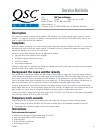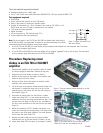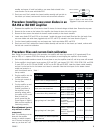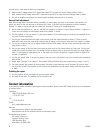4 ISA0001
and wait until it cools down to about room temperature.
6. Measure the DC voltage across R147. Adjust bias trimpot R131 to reach the correct voltage shown in Table 1.
7. Next, measure the DC voltage across R247. Adjust bias trimpot R231 to reach the correct voltage shown in Table 1.
8. Turn off the amplifier and reattach the channel module assembly and heat sink to the chassis.
Current limit adjustment
Note: Read through these instructions before proceeding. To avoid tripping the amp’s circuit breaker, work carefully but
quickly, and don’t run the amp too long at full power into 2 ohms. If you don’t have the equipment to do this procedure
properly, it is better to skip it and leave the current-limit trimpots as is than to risk misadjusting them.
9. Set the audio sine generator to 1 kHz at 1 volt RMS and connect it to channel 1's input. Connect channel 1's output to a
2-ohm load, and connect the oscilloscope probe across channel 1's output.
10. Turn the amplifier on. Turn up channel 1's gain control partway. On the oscilloscope you should see the amplitude of the
sine wave increase accordingly.
11. Turn the gain control back down and apply a short circuit across the output terminals of channel 1. Clamp a current
probe either onto one of the brown wires running to the AC switch or onto the gray output wire from channel 1's module.
12. Turn the gain control all the way up. Adjust trimpots R139 and R140 equally until the current measured falls within the
range shown in Table 1.
13. Turn the gain control all the way down and remove the short circuit so the channel drives the 2-ohm load. Turn the gain
control back up until the output clips. The voltage at which the signal starts to clip should fall within the range shown in
Table 1. If the clipping is asymmetrical, that is, the signal clips on either the positive or negative side first, adjust R139
to make it symmetrical.
14. Turn the gain control down. If the amp has begun to warm up, shut it off and let it cool a few minutes before proceeding
with channel 2.
15. Repeat steps 8 through 12 for channel 2. Use trimpots R239 and R240 to adjust the current limiting in steps 11 and 12.
16. Turn both channels’ gain controls all the way down. Clamp the current probe onto one of the brown AC wires to check
the amp’s idle current. If the amplifier is still at about room temperature, the idle current should match the value shown
in Table 1.
Finishing the repair
17. Turn the amplifier off and disconnect all input and output cables.
18. Re-install the top cover. The amplifier can be returned to use.
Contact information
If you need any further information regarding this service procedure, please contact QSC Technical Services at the addresses
or numbers below.
Telephone:
1-800-772-2834 (within USA only)
+1 (714) 957-7150
Fax:
+1 (714) 754-6173
E-mail:
tech_support@qscaudio.com
Web site:
www.qscaudio.com (product info and support)
www.qscstore.com (on-line technical services and accessory sales)
Postal and parcel address:
QSC Audio Products, Inc.
Technical Services Group
1665 MacArthur Blvd.
Costa Mesa, CA 92626 USA






